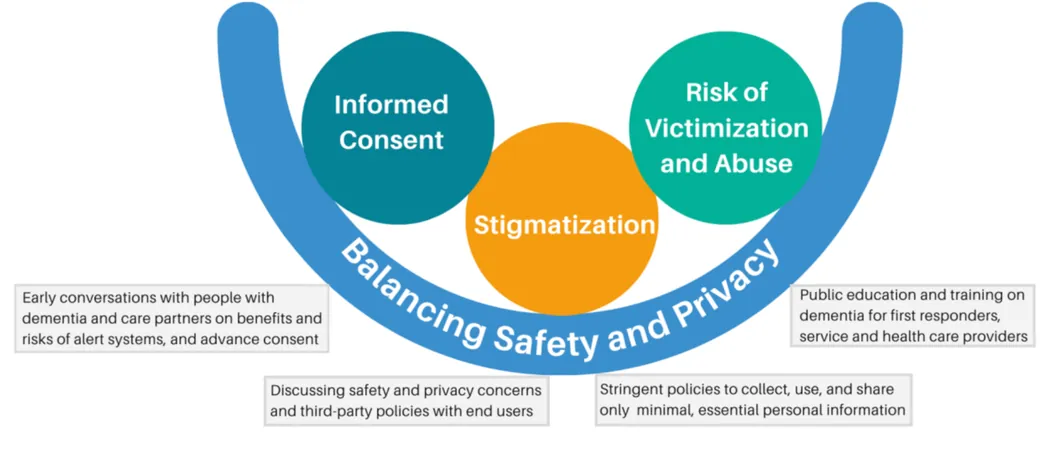
Dementia Alert Systems: A Life-Saving Innovation or Ethical Dilemma?
2025-05-05
Author: Jia
In a world where over 55 million individuals suffer from dementia, a number anticipated to double every two decades, the urgency for effective solutions is stark. Dementia severely impairs navigation and recognition, leaving many at risk of going missing. In fact, 40-60% of individuals with dementia will find themselves lost at least once in their lifetime, and 5% may repeatedly go missing, creating a devastating situation for families.
Fatal Consequences of Missing Persons with Dementia
When not located within 24 hours, nearly half of these individuals face serious injuries or even death. With a staggering global financial impact estimated at $1.3 trillion in 2019, the crisis surrounding dementia not only affects individuals but also heavily strains healthcare systems. As no feasible treatments exist, the focus has shifted to prevention, management, and support for those with dementia and their caregivers.
Can Technology Help? Enter Alert Systems
Technological innovations, particularly community alert systems, are stepping up to engage neighborhoods in the search for missing persons with dementia. These systems utilize wireless networks, media outlets, social media platforms, and mobile apps to broadcast crucial information about missing individuals—ranging from their names and photos to medical conditions.
The Spectrum of Alert Systems
Various existing alerts target unique groups, such as Green Alerts for veterans and Gold Alerts for individuals with cognitive impairments. However, the well-known Amber Alert for missing children is deemed inappropriate for adults with dementia since these disappearances usually don’t involve crime.
Purple Alert: A Community-Driven Solution
Notably, the Purple Alert system initiated by Alzheimer Scotland empowers families to involve the community in searches through a dedicated app. Similar technologies, like Sweden's Safeland app, facilitate emergency sharing of information and vigilance in communities. In the U.S., the Silver Alert program—though a publicly funded initiative—exhibits varying success across states, prompting discussions about its efficacy and limitations.
Ethical and Legal Minefield
Despite the noble intentions behind these systems, ethical and legal concerns loom large. The public disclosure of a missing person's information poses myriad risks, including identity theft and privacy violations. Regulations in Canada, like the Privacy Act and PIPEDA, set rules on how personal information is shared, complicating how quickly alert systems can act.
Navigating the Ethical Labyrinth
A recent study highlighted concerns from key community members—including patients, caregivers, and legal experts—about the balance between safety and privacy. While urgency in locating a missing person often leads to prioritizing safety, participants voiced the critical need for ethical guidelines that uphold individual rights and minimize harm.
Themes of Concern: Safety Vs. Privacy
The insights gathered from interviews reveal four primary themes: balancing safety and privacy, combating stigmatization, managing risks of victimization and abuse, and ensuring informed consent. Many participants believed that while locating missing patients is paramount, the potential for stigmatization—particularly surrounding dementia—can deter families from seeking help.
Victimization Risks Under Scrutiny
Participants also warned that publicizing a dementia diagnosis places individuals at a heightened risk of victimization, as malicious actors may prey on those seen as vulnerable. Confidentiality, therefore, isn't just a preference; it's a necessity.
The Need for Informed Consent
Another critical issue raised centered on informed consent in using these alert systems. Many participants argued that conversations about alert systems rarely happen before a person with dementia goes missing. A culture of assuming incompetence overlooks the rights of those with dementia to engage in discussions about their care and privacy.
Toward a Balanced Framework
To navigate these pressing concerns, the study proposed a framework for ethical and legal considerations in alert systems. By synthesizing themes of safety, privacy, and stigmatization, the framework aims to guide policies that protect individuals while effectively mobilizing community action in urgent situations.
Educational Initiatives as a Solution
Implementing public education initiatives is vital for shifting perceptions about dementia and reducing stigma. Such programs could equip caregivers, first responders, and the general community with a better understanding of the challenges faced by those living with dementia and their families.
Conclusion: A Call for Action
As the technology behind community alert systems continues to evolve, it’s imperative that we ensure these tools serve to protect the dignity and rights of all individuals—especially the vulnerable. With ethical frameworks in place and ongoing dialogues in the community, we can strike the necessary balance between safety and privacy, making strides in supporting people living with dementia.

 Brasil (PT)
Brasil (PT)
 Canada (EN)
Canada (EN)
 Chile (ES)
Chile (ES)
 Česko (CS)
Česko (CS)
 대한민국 (KO)
대한민국 (KO)
 España (ES)
España (ES)
 France (FR)
France (FR)
 Hong Kong (EN)
Hong Kong (EN)
 Italia (IT)
Italia (IT)
 日本 (JA)
日本 (JA)
 Magyarország (HU)
Magyarország (HU)
 Norge (NO)
Norge (NO)
 Polska (PL)
Polska (PL)
 Schweiz (DE)
Schweiz (DE)
 Singapore (EN)
Singapore (EN)
 Sverige (SV)
Sverige (SV)
 Suomi (FI)
Suomi (FI)
 Türkiye (TR)
Türkiye (TR)
 الإمارات العربية المتحدة (AR)
الإمارات العربية المتحدة (AR)